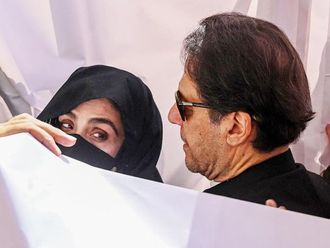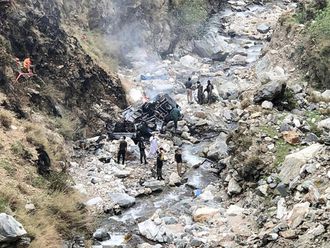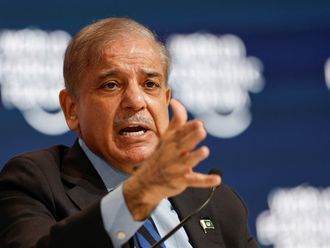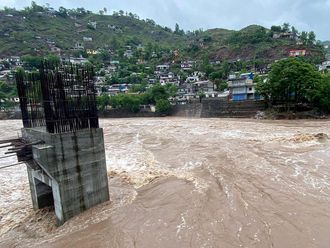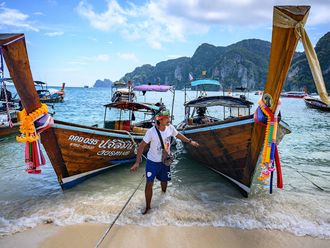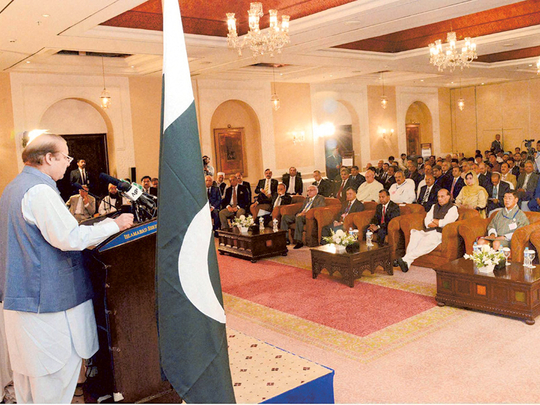
Islamabad: India called on Thursday for isolation of countries deemed to be supporting terrorism, while Pakistan decried “brutal force” against civilians resisting occupation as the nuclear-armed neighbours’ rivalry spilled over into a regional conference.
Traditionally tense relations between Pakistan and India have been strained further in recent weeks by a flare-up in protests against the Indian government in the state of Jammu and Kashmir, in which about 50 people have been killed.
Indian Interior Minister Rajnath Singh arrived in Islamabad on Wednesday evening amid anti-India protests organised by terror groups including the United Jehad Council – a militant amalgam of groups fighting in Kashmir but based in Pakistan.
Singh had already ruled out bilateral talks with Pakistan on the sidelines, and in his speech to the forum castigated any support for militants.
“One country’s terrorist cannot be a martyr or freedom fighter for anyone,” he said. “Those who provide support, encouragement, sanctuary, safe haven or any assistance to terrorism or terrorists must be isolated.”
Singh did not mention Pakistan by name but India accuses its neighbour of sheltering militants fighting against India.
Pakistan denies supporting militants but say it offers political support to the “freedom struggle” of the people of the Muslim-majority region of Kashmir.
Pakistani Interior Minister Nisar Ali Khan, in his remarks, “drew the attention of Saarc member states to the use of brutal force... against unarmed civilians engaged in a struggle against foreign occupation”, a barely-veiled reference to Kashmir.
Khan said he hoped the Saarc meeting could be a forum for “a lot of soul-searching on all sides”.
“Maybe that will provide us with the opportunity for... our leadership to sit together informally and work out solutions to the problem that have been afflicting this region... discussions which might not be possible in the glare of media publicity, heart-to-heart discussions,” Khan told the opening session.
It was the first visit by an Indian minister to Pakistan after the January attack on the Indian Air Force base at Pathankot, also blamed on terrorists from Pakistan.
The Indian minister was taken to his hotel in a helicopter as he was given a “presidential level security” amid threats by the militant groups.
Prime Minister Nawaz Sharif on Thursday said Pakistan is committed to jointly working with Saarc member countries for fighting terrorism, corruption and organised crimes.
Addressing the inaugural session of the Saarc Interior/Home Ministers’ Conference, Sharif cited Pakistan’s anti-terror operations in restive tribal areas and National Action Plan to emphasise “the government’s determination to eliminate the scourge of terrorism from our soil for good.”
He said the Saarc region is blessed with tremendous human and natural resources. “So, Saarc can and should provide a platform to optimally harness the regional potential for peace and prosperity of our people.”
Sharif said such an approach is in sync with his government’s vision of “peace for development and peaceful neighbourhood”.
“Pakistan has always been supportive of initiatives taken by Saarc to advance its ideals and objectives as enshrined in its charter,” he said.
He said Pakistan has also been strong advocate of stepping up regional efforts to ensure energy security through sharing of indigenous sources.
Sharif said Pakistan shares the perception that connectivity is critical to the progress and prosperity of the region and supports, in principle, road, air, rail and water connectivity within the region.
“Realisation of the goals and objectives envisaged in Saarc charter is our collective responsibility,” he said.


